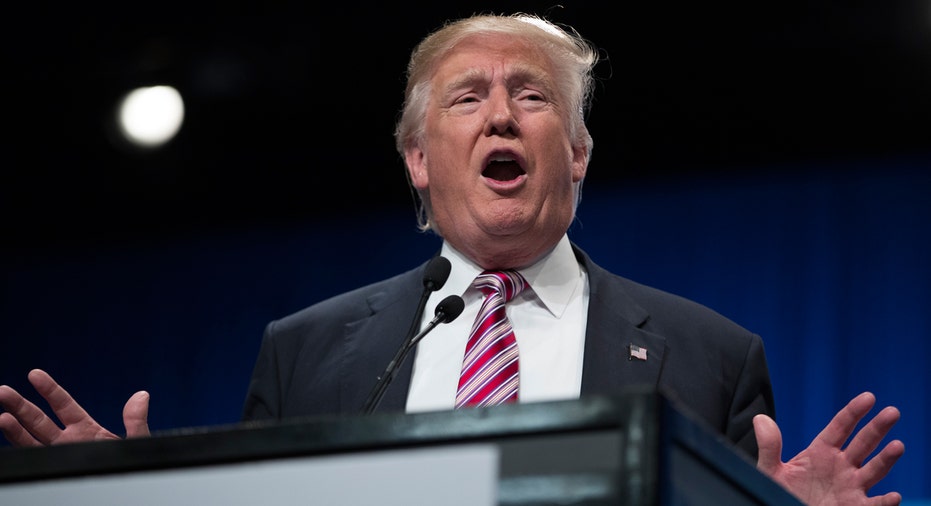Donald Trump's War on Political Correctness

After the primaries, the pundits said that Donald Trump should pivot from his typical sort of bombastic persona and become more presidential. If you follow him on Twitter, you know that he didn’t exactly follow their advice. On the contrary, he’s been just as provocative and outspoken as ever.
Instead of The Art of the Deal, maybe Trump would have been better off mastering The Art of Diplomacy. Or maybe not.
Since day one, Trump has run his campaign exactly the way he wanted to – maybe the only way he knows how. And now just one opponent stands between him and the White House. That’s a damn good result for a political outsider who nobody thought had a chance of winning the Republican nomination.
What if all the pundits are wrong? What if Trump knows exactly what he’s doing? What if this turns out to be the winning strategy? Maybe that sounds far-fetched, considering all the hot water his cringe-worthy comments are getting him into with folks on both sides of the isle, these days. But what if it’s not?
If you long for a time when freedom of speech included the right to make controversial statements that might offend some people without being ostracized from society, you probably like Trump – not in spite of the dumb things that sometimes come out of his mouth, but because he’s not afraid to say them.
In a recent Esquire interview, Clint Eastwood said that Trump is “onto something, because secretly everybody's getting tired of political correctness, kissing up,” he said. “Everybody's walking on eggshells. We see people accusing people of being racist and all kinds of stuff. When I grew up, those things weren't called racist.”
When he was asked, “What do you think Trump is onto?” Eastwood replied, “He’s just saying what’s on his mind.”
I agree, that is what Trump has tapped into. People are sick and tired of having to filter everything they say and do because they’re afraid of being labeled a racist or a sexist and being sued or losing their jobs. In the minds of many Americans, political correctness is a real threat to “Life, liberty, and the pursuit of happiness.”
Perhaps making America “safe and prosperous again” is the logical reason behind the Trump phenomenon. But, as I see it, the emotional reason – the real heart of the movement – is to make America a place where we can speak our minds and live our lives without fear of prosecution again.
Isn’t that a core principle this nation was founded upon? Isn’t that a key reason we broke from England’s tyranny in the first place? Is it so far-fetched for a backlash against what’s quickly becoming a ubiquitous cultural trend that threatens our fundamental rights – if not our prosperity and safety – to be the defining issue of a presidential race?
As you might expect, Eastwood’s comments were met with a reaction characteristic of many of Trump’s more contentious statements. One particularly viral tweet from British screenwriter James Moran said, “Clint Eastwood is right, it wasn't called ‘racist’ when he was growing up. But now it is. That's what happens when you grow up.”
Never mind the irony of where Moran lives. That tweet sort of defines a key battle line of this election. Individuals are unilaterally dictating what is and isn’t acceptable to say and do by trying to silence those who don’t share their view. Meanwhile, many Americans don’t buy into the notion that racism and sexism are defined by whatever offends some thin-skinned whiner, PC zombie or special interest group.
Eastwood is far from alone in thinking that Trump is “onto something.” In Revolt of the Politically Incorrect, The Wall Street Journal’s Dan Henninger wrote, “Many thought political correctness lived on in our lives now as permanently annoying background noise. In fact, it has been more like a political A-bomb, waiting for its detonator.”
“When Donald Trump’s mostly working-class voters repeatedly said that ‘he tells the truth,’” Henninger wrote, “This is what they were talking about—not any particular Trump outrage but the years of political correctness they felt they’d been forced to choke down in silence.”
Every so often we hear reports of a Republican backlash against Trump. I wouldn’t be surprised to find there’s truth to that. In my opinion, kowtowing to the PC crowd and allowing things to get this out of hand instead of standing strong behind fundamental conservative principles is how the GOP gave rise to political outsiders like Trump and Ben Carson in the first place. Why in the world would Trump listen to them and back down now?
Republicans want Trump to stay on message. Saying what’s on his mind is the message. Nobody is going to tell him what to say, how to think or how to act. Of all people, the Donald – the consummate deal maker and showman – may very well be running the most honest political campaign you and I have ever witnessed. To me, it’s refreshing, actually.
In his closing paragraph, Henninger wrote, “The election’s two big issues remain: a weak economy and global chaos. But for many voters, the revolt against political correctness is on.”
The inimitable Eastwood was somewhat less diplomatic, “He's said a lot of dumb things. So have all of them. Both sides. But everybody—the press and everybody's going, ‘Oh, well, that's racist,’ and they're making a big hoodoo out of it,” he said. “Just f-----g get over it.”



















